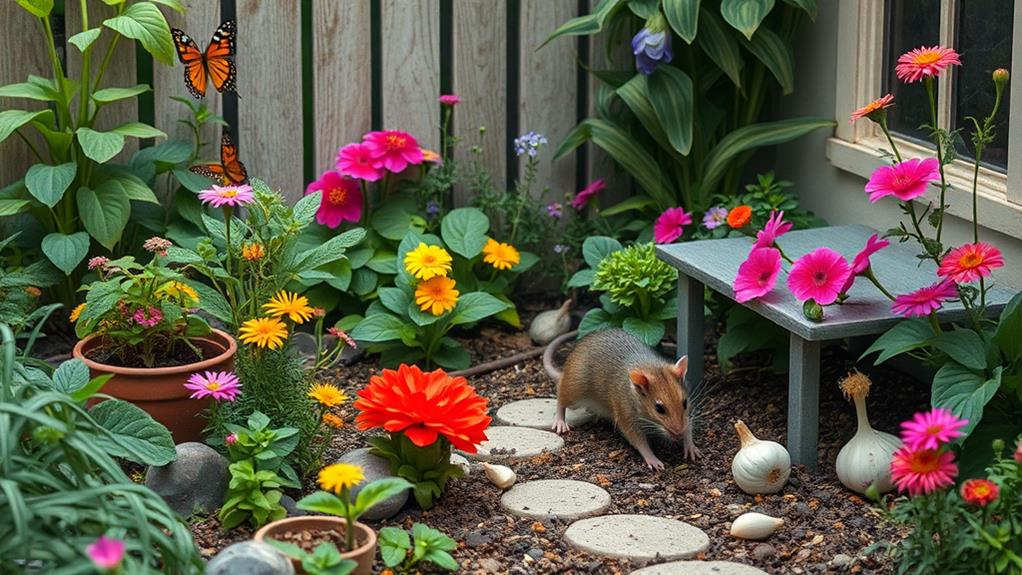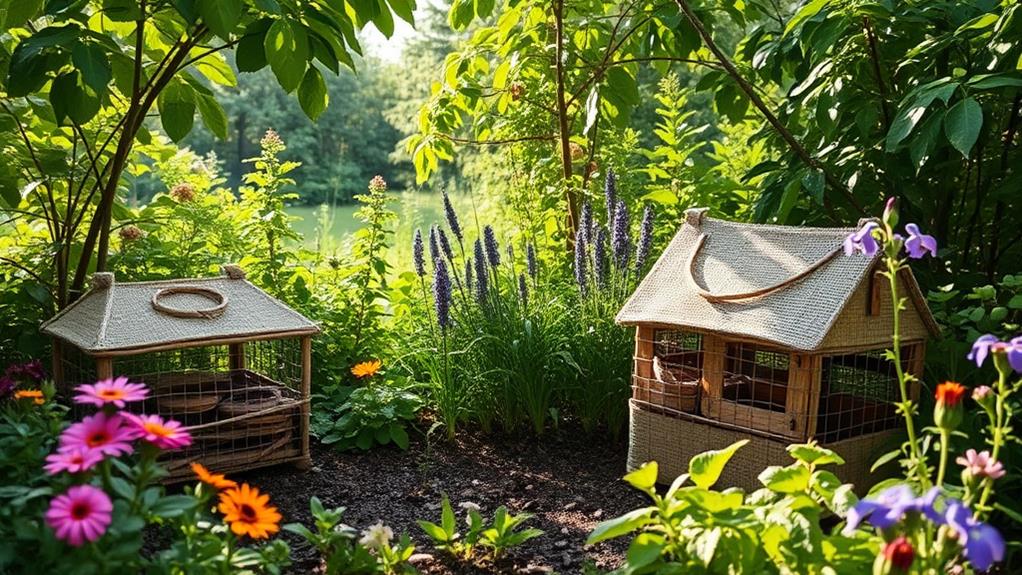When it comes to keeping your home and garden rat-free, understanding their behavior is essential. You might be surprised to learn that simple, natural ingredients can serve as effective deterrents, making your space less inviting for these unwanted visitors. By incorporating methods like essential oils and specific herbs, you can create a harmonious environment that benefits both your family and local wildlife. But before you rush to gather supplies, consider how these strategies fit into a broader plan for long-term prevention. What steps can you take today to guarantee your garden remains a sanctuary?
Understanding Rat Behavior

Have you ever wondered why rats invade homes? Well, let's unravel the mystery!
Rats are clever little creatures that are always on the lookout for food, shelter, and a cozy place to raise their families. They don't need much to feel at home; just a tiny crack or hole will do! If they smell food, they'll quickly make your pantry their dining room.
Rats are nocturnal, which means they love to party when you're asleep. They're sneaky, too! You mightn't even notice them until they've moved in.
They're social animals and prefer to live in groups, which is why you might see one little rat and think, "Uh-oh, there's probably more!"
They're also pretty smart. If something scares them, they'll learn to avoid it next time. That's why using strong traps or chemicals mightn't always work.
It's important to think like a rat; figure out what they want and why they're in your space. Understanding their behavior can help you outsmart them and keep your home blissful and rat-free.
Essential Ingredients for DIY Solutions
When tackling a rat problem, having the right DIY solutions can make all the difference. You don't need fancy products or harsh chemicals; just a few essential ingredients can do the trick.
First up, consider using essential oils like peppermint or lavender. Rats can't stand these smells, so they can help keep them away. Mixing a few drops with water in a spray bottle creates a natural repellent you can use around your home.
Next, think about vinegar. It's not just for salad dressing! Vinegar's strong scent can deter rats when sprayed in areas where you've spotted them.
And don't forget about baking soda. Mixing it with sugar creates a simple bait that can be effective. Just be careful where you place it, so your pets stay safe.
Lastly, cayenne pepper is another great option. Just sprinkle it in areas where you think rats may roam. They'll be in for a spicy surprise!
With these ingredients, you can whip up effective DIY solutions that are safe for your home and family. So roll up your sleeves and get ready to reclaim your space!
Natural Deterrents for Rats

If you're looking to keep rats at bay, natural deterrents can be your best ally. There are several easy and effective methods you can try that won't harm your garden or pets.
For starters, consider using essential oils like peppermint or eucalyptus. Rats can't stand the strong smell! Just mix a few drops of your chosen oil with water in a spray bottle and spritz it around areas where you've spotted the little critters.
Another great option is using a mixture of cayenne pepper and water. Rats dislike spicy scents, so this can really make them think twice about entering your space. Sprinkle some cayenne pepper in places like your garage or shed to help keep them away.
You can also plant herbs like rosemary or mint around your garden. Not only do they smell great, but they also act as natural repellents. Plus, you'll have fresh herbs for your cooking!
Creating a Rat-Proof Garden
To effectively create a rat-proof garden, start by eliminating any potential hiding spots and food sources that could attract these pests. Rats love to hide in tall grass, piles of leaves, or clutter in your garden shed. So, keep your garden tidy! Trim those overgrown bushes and clear out any debris.
Next, make sure you're not providing a free buffet for them. Store pet food and birdseed in airtight containers. Also, pick up any fallen fruits or vegetables as soon as you can. You wouldn't want to invite your neighbors over for dinner, right?
Another handy trick is to use raised garden beds. They're harder for rats to access and make it easier for you to monitor what's going on. Plus, they look great!
Lastly, consider using natural deterrents like specific plants that rats dislike. Think peppermint or lavender—who knew they could help keep those little critters away while adding some lovely scents to your garden?
Traps and Baits: Eco-Friendly Options

Maintaining a tidy garden can greatly reduce the chances of rats taking up residence, but if they do make an appearance, using traps and baits can be an effective and eco-friendly way to manage the situation.
Instead of resorting to harmful chemicals, consider natural traps like live catch traps. These traps allow you to capture rats without hurting them, so you can release them far away from your home. Just remember to check them daily, because no one wants a surprise when they go to the garden!
For bait, you can use things like peanut butter or sunflower seeds. Rats love these tasty treats! You can place the bait in the traps to lure the critters. Make sure to put the traps in areas where you've seen signs of rat activity, like droppings or chewed plants.
And here's a fun tip: you can also sprinkle some cayenne pepper around the traps. Rats dislike the smell, and it might just keep them away!
Using eco-friendly traps and baits not only helps you maintain your garden but also keeps our furry friends safe. Who knew pest control could be so kind?
Maintaining a Clean Environment
Keeping your environment clean is essential in preventing rats from settling in. If you want to keep these pesky critters at bay, start by tidying up your home and garden.
Make certain to pick up any food scraps or crumbs lying around, because, let's face it, rats love a good buffet! Store your food in airtight containers, and take out the trash regularly.
In your garden, clear away fallen fruits, vegetables, and any debris that might attract rats. Trim back overgrown plants and keep your compost bins secure.
If you have pet food, don't leave it out for too long—those little guys are always on the lookout for an easy meal!
Also, ascertain there are no hidden nooks and crannies where rats can hide. Seal any cracks or holes in your home's exterior.
This way, you're not only cleaning but also making it harder for them to sneak inside.
Monitoring and Assessing Rat Activity
Effective monitoring and evaluating rat activity is essential for tackling a potential infestation before it spirals out of control.
First, you'll want to look for telltale signs of rat presence. Droppings, gnaw marks, or shredded materials can signal that you've got some uninvited guests. Keep an eye out for nests, too; they often hide in dark, cozy corners.
Next, set up some simple traps or bait stations in areas where you suspect rats might be sneaking around. This isn't just for catching them; it helps you track their movements. Check these spots regularly. If you find a few caught, that's a good sign you're addressing the issue!
You can also use a journal to note when and where you see signs of rats. This way, you'll have a clear picture of their activity patterns.
And remember, staying vigilant is key! The sooner you spot a problem, the easier it'll be to keep your home rat-free. Who knew keeping an eye on pesky critters could be so important?
Long-Term Prevention Strategies
To ward off future rat infestations, you'll want to focus on sealing up entry points and eliminating food sources.
Start by walking around your home and looking for tiny holes or gaps. Rats can squeeze through surprisingly small spaces, so a hole the size of a quarter is a potential entry! Use steel wool or caulk to seal these areas.
Next, tackle those hidden food sources. Store all your food in airtight containers, and don't forget about pet food. Clean up any crumbs or spills promptly, because rats love a free meal.
If you have a garden, pick up fallen fruits and veggies, since they can be a buffet for these critters.
Also, keep your yard tidy. Trim back overgrown shrubs and remove any clutter like piles of wood or leaves, which can provide shelter.
And finally, consider planting herbs like mint or using scents like peppermint oil. Rats dislike these smells, and you'll enjoy a fresh scent in your garden!
With these steps, you can create a rat-free zone that's blissful for you and your home.
